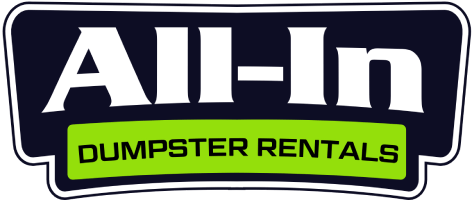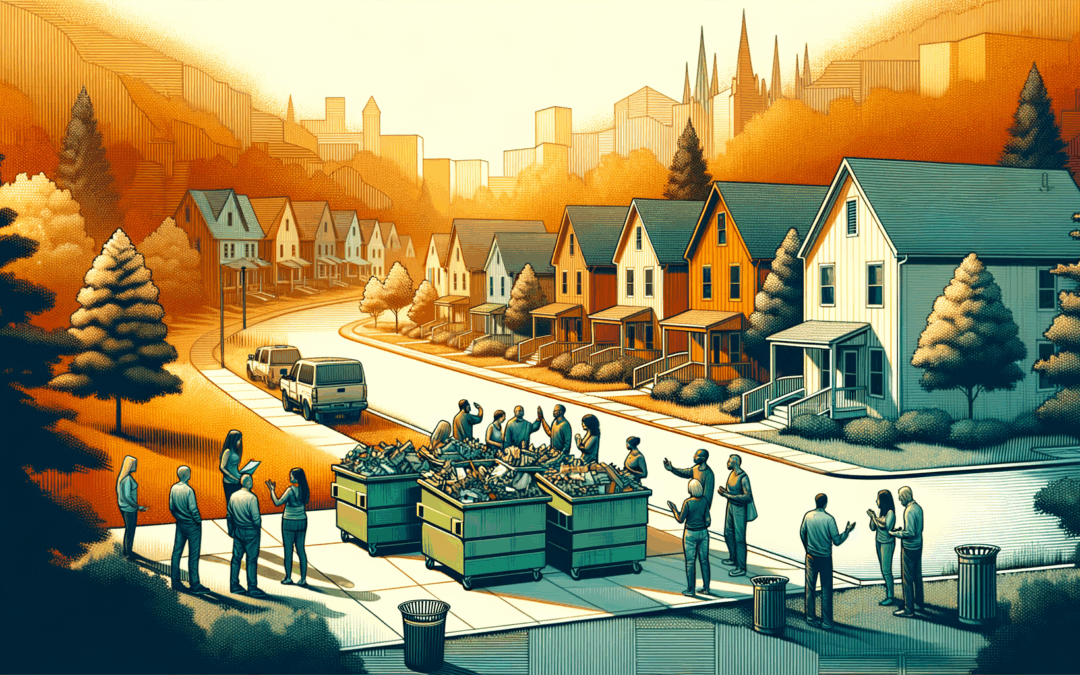Community pride runs deep here in Asheville. From our vibrant downtown to our leafy neighborhoods tucked into the Blue Ridge foothills, we take care of our mountain paradise together. Yet when cleanup day arrives – whether it’s after autumn leaves blanket our yards or spring decluttering fever hits – the cost of waste removal can be daunting for individual homeowners.
Here in Western North Carolina, we’ve noticed a growing trend that combines our community spirit with practical savings: shared dumpster rentals. As we help neighbors throughout Asheville, Hendersonville, Woodfin, and surrounding areas, we’re seeing more community-organized cleanups using a single dumpster to reduce costs while strengthening neighborhood bonds.
Group rentals make perfect sense in our tight-knit communities. Why should every homeowner on Cedar Street pay for their own dumpster when one strategically placed container can serve the whole block? The mountains have taught us to be resourceful, and collaborative waste management is a natural extension of our local values.
The Economics of Shared Dumpster Rentals
The math is simple and compelling. A standard 15-yard dumpster in Asheville costs between $350-$450 for a week’s rental. When five neighbors split that cost, each household pays only $70-$90 – a fraction of individual rental prices.
Beyond the obvious savings, there are other economic benefits to consider. Coordinating delivery and pickup times for a single dumpster is more fuel-efficient and reduces traffic in your neighborhood. Rather than five separate trucks making five trips, one delivery serves multiple homes.
Many local neighborhoods like Montford, West Asheville, and Kenilworth have already embraced this approach. During fall leaf season or after summer storms, you’ll spot shared dumpsters serving entire blocks, with neighbors working together to fill them efficiently.
For some perspective: if your neighborhood organizes quarterly cleanups with shared dumpsters, each household could save upwards of $1,000 annually compared to individual rentals. That’s money that stays in our local economy and your family budget.
Organizing Your Neighborhood Dumpster Share
Getting started with a neighborhood dumpster share is simpler than you might think. We’ve helped dozens of Asheville communities organize successful programs, and these steps consistently work well:
Start by gauging interest through conversations with immediate neighbors or through your neighborhood’s social media group. Apps like Nextdoor are particularly active in areas like Kenilworth and North Asheville, making them perfect for coordinating cleanup efforts.
Once you have interest from 4-8 households (the ideal size for most shares), designate a coordinator who will handle the rental arrangements. This person will be the point of contact for the rental company and will collect contributions from participants.
Choose a central, accessible location for the dumpster that won’t block driveways or emergency access. Remember that mountain neighborhoods with narrow, winding roads may have limitations on placement. A flat, stable surface is essential – something we know can be challenging in our hilly terrain!
Create a simple agreement outlining costs, duration, acceptable materials, and cleanup responsibilities. Having these details in writing prevents misunderstandings and ensures everyone contributes fairly.
Consider scheduling your shared rental during seasonal transition points – spring cleaning, fall yard work, or before holiday decorating begins. These natural cleanup times align with when most households are already tackling projects.
Fair Cost Distribution Methods
The success of your neighborhood dumpster share depends largely on how fairly costs are distributed. From our experience serving communities throughout Buncombe County, these approaches work best:
Equal splits work well for neighborhoods where homes are similar in size and likely to generate comparable amounts of waste. This straightforward approach – dividing the total cost by the number of participants – is perfect for planned communities like those in South Asheville.
Usage-based splits can be appropriate when participants have significantly different needs. Some neighbors might use a small portion of the dumpster while others need more space. In these cases, participants can agree on percentages beforehand.
Project-based contributions make sense for specific community improvement efforts. When clearing communal spaces or helping an elderly neighbor with property cleanup, contributions might vary based on ability to pay rather than usage.
Collection methods should be transparent and simple. Many neighborhood groups in Asheville use payment apps like Venmo or CashApp for convenience, while others prefer a designated treasurer who handles cash contributions.
The key is clarity upfront. When everyone understands their financial commitment before the dumpster arrives, the sharing experience goes smoothly.
Navigating Potential Challenges
Even with the best planning, shared dumpster arrangements can face challenges. Here’s how to prevent common issues we’ve seen across Western North Carolina:
Overloading concerns arise when participants don’t coordinate their disposal timing. Create a loose schedule allowing each household specific days or time blocks for using the dumpster. This prevents any single participant from filling the entire container.
Prohibited items can lead to additional fees that affect everyone. Circulate a clear list of what cannot go in the dumpster – things like paints, electronics, and certain appliances that require special disposal in Asheville.
Non-participant usage happens when others notice the dumpster and add their waste without contributing. Consider placing the dumpster in a semi-private location or posting a friendly sign indicating it’s for specific households only.
Logistics disputes can emerge around delivery timing, placement, and pickup. Having one designated coordinator who communicates with both the rental company and all participants helps prevent miscommunications.
Payment delays complicate the experience for everyone. Collect contributions before the dumpster arrives rather than chasing payments afterward. This approach has proven most successful for neighborhood shares throughout Henderson and Buncombe counties.
Beyond Cost Savings: Community Benefits
While the financial advantages of shared dumpster rentals are compelling, the community benefits we’ve witnessed across Asheville often prove even more valuable:
Neighborhood cleanup events can transform from solitary chores into social gatherings. We’ve seen communities in Fletcher and Weaverville turn dumpster day into mini-block parties, with neighbors helping each other with heavy items while catching up over coffee.
Resource sharing often extends beyond the dumpster itself. Once neighbors coordinate on waste removal, they frequently begin sharing tools, expertise, and even contractor recommendations – creating a resource network that benefits everyone.
Community pride increases as properties are maintained together. When an entire street or cul-de-sac cleans up simultaneously, the visual impact is dramatic, contributing to neighborhood satisfaction and potentially even property values.
Support for vulnerable residents becomes easier when neighbors coordinate cleanup efforts. We’ve watched communities in North Asheville use shared dumpsters to help elderly neighbors or those facing temporary hardships maintain their properties.
Environmental awareness grows through collaborative disposal. When neighbors discuss what goes in the dumpster versus what can be recycled, composted, or donated, everyone learns better waste management practices.
Seasonal Strategies for Asheville Neighborhoods
Our unique mountain seasons each bring distinct cleanup challenges. Here’s how neighborhood dumpster shares can be optimized throughout the year in Western North Carolina:
Spring cleanup shares work wonderfully after winter storms have left debris and before outdoor entertaining season begins. April is ideal for Asheville neighborhoods as residents prepare gardens and outdoor spaces.
Summer storm response can be coordinated when quick cleanup is needed. After those intense summer thunderstorms roll through our mountains, having a system already in place for sharing emergency cleanup resources proves invaluable.
Fall leaf and yard waste removal becomes much more manageable with shared containers. Given Asheville’s magnificent autumn colors, the subsequent leaf fall is substantial – making this season perfect for dumpster sharing.
Holiday cleanup partnerships help manage the extra waste generated during the holiday season. From packaging materials to old items replaced by new gifts, January is an excellent time for community disposal cooperation.
Construction coordination can help when several neighbors happen to be doing renovation projects around the same time. This is especially common in Asheville’s historic neighborhoods where home improvements often follow similar timelines.
Real Success Stories from Around Asheville
The concept of neighborhood dumpster sharing isn’t just theoretical – it’s already working beautifully across Western North Carolina:
The Montford Historic District organizes quarterly cleanup weekends with strategically placed shared dumpsters. Their well-established system has reduced individual waste removal costs by approximately 60% while maintaining the neighborhood’s historic charm.
A mountain community in Fairview faced unique challenges with their steep, narrow roads. By coordinating a single dumpster placement at the neighborhood entrance, they overcame access issues while building stronger community ties during their bi-annual cleanup events.
West Asheville’s vibrant neighborhoods have embraced dumpster sharing as part of their community-building toolkit. One street turned their monthly “first Saturday” cleanup into a rotating schedule, with different neighbors hosting the dumpster and a post-cleanup potluck each month.
A retirement community in Hendersonville created a sustainable system where younger residents help older neighbors with heavy lifting during shared dumpster days. This intergenerational cooperation has benefits far beyond waste management.
After severe weather events, several Asheville neighborhoods have implemented emergency dumpster sharing protocols. This preparation allows for quick response when fallen trees or storm damage requires immediate cleanup.
Working with Local Rental Companies
As a local, family-owned business serving Asheville and surrounding communities, we’ve developed some recommendations for getting the best service for your neighborhood share:
Communicate your shared arrangement clearly when booking. Many local companies (ourselves included) appreciate knowing they’re serving multiple households and may offer helpful advice specific to community cleanups.
Ask about community discounts. Some Asheville-area companies offer special rates for neighborhood associations or group rentals that aren’t advertised but are available upon request.
Discuss placement carefully, considering both accessibility and minimal disruption. Local companies familiar with Asheville’s unique terrain can provide valuable guidance on safe placement in mountain neighborhoods.
Establish clear communication channels between your neighborhood coordinator and the rental company. Having a single point of contact prevents confusion and ensures smooth service.
Plan ahead, especially during peak seasons. Spring and fall are particularly busy for dumpster rentals in Asheville, so book your neighborhood’s container at least 2-3 weeks in advance for these popular times.
Looking Forward: Growing the Sharing Concept
The neighborhood dumpster sharing movement is gaining momentum across Asheville, and we’re excited about where it’s headed:
Many neighborhoods are formalizing their sharing programs through homeowners’ associations or community groups, creating sustainable systems that continue year after year. This institutionalization helps new residents easily join existing arrangements.
Digital tools are making coordination easier. Some Asheville neighborhoods have created simple online signup systems for tracking participation, scheduling, and payments – streamlining the administrative aspects of sharing.
Multi-neighborhood coordination is emerging for larger community projects. We’ve seen adjacent neighborhoods in South Asheville partner for creek cleanups and invasive species removal using shared waste disposal resources.
Knowledge sharing between communities helps spread best practices. Successful neighborhood programs from Woodfin to Arden are documenting their approaches and sharing them with other communities looking to start similar initiatives.
Environmental impact tracking is becoming part of some neighborhood programs. By documenting the waste diverted through proper disposal, communities can celebrate their positive environmental contribution.
Ready to Organize Your Neighborhood Share?
Community-based dumpster sharing represents the best of Asheville’s values – environmental responsibility, neighbor helping neighbor, and practical mountain resourcefulness. By pooling resources, we not only save money but strengthen the connections that make our Western North Carolina communities special.
If your neighborhood is considering organizing a shared dumpster rental, we’re happy to provide guidance specific to your location and needs. Our experience serving communities throughout Buncombe, Henderson, Haywood, and Madison counties gives us insight into what works for the unique characteristics of each area.
Whether you’re looking to coordinate a one-time neighborhood cleanup or establish a recurring arrangement, the benefits extend far beyond cost savings. From Weaverville to Fletcher, from Candler to Black Mountain, we’ve seen these shared arrangements foster deeper community connections while keeping our beautiful mountain region clean and well-maintained.
When neighbors work together on practical solutions like waste management, we build the foundation for cooperation on bigger community challenges. It’s one more way we maintain the special quality of life that makes Asheville and Western North Carolina such a wonderful place to call home.

